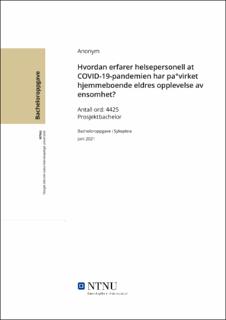| dc.contributor.advisor | Jørgensen, Wanja | |
| dc.contributor.author | Schjødt, Clara | |
| dc.date.accessioned | 2021-09-25T16:22:47Z | |
| dc.date.available | 2021-09-25T16:22:47Z | |
| dc.date.issued | 2021 | |
| dc.identifier | no.ntnu:inspera:81643445:43168233 | |
| dc.identifier.uri | https://hdl.handle.net/11250/2782874 | |
| dc.description.abstract | Innledning: Studiet tar for seg hvordan helsepersonell i kommunehelsetjenesten erfarer at COVID-19-pandemien har påvirket hjemmeboende eldres opplevelse av ensomhet, og hva årsakene til dette er. Simultant belyser studien hvordan helsepersonellet opplever at de har håndtert ensomheten under pandemien, og hvilken rolle de opplever å ha ovenfor å ivareta hjemmeværende eldres sosiale behov.
Metode: Det ble gjennomført seks kvalitative, semistrukturerte intervju med helsepersonell i ulike institusjoner innenfor kommunehelsetjenesten som hadde erfaring med temaet. Intervjuene ble gjennomført i februar og mars 2021 og analysert etter prinsippene for systematisk tekstkondensering.
Resultater: Resultatene viser at helsepersonell opplevde at det var stor forekomst av ensomhet blant de hjemmeværende eldre og at COVID-19-pandemien hadde forsterket dette. Helsepersonellet erfarte at en viktig årsak til økt opplevelse av ensomhet under pandemien var økt sosial isolasjon blant de eldre, som følge av stengte tilbud og mindre kontakt med helsepersonell og bekjente. Smitteutstyr opplevdes av flere som en barriere for den mellommenneskelige kontakten. Helsepersonellet opplevde også at de spilte en viktig rolle i å ivareta de eldres sosiale behov, men flere erfarte at dette ansvaret hadde vært vanskelig å oppfylle under pandemien grunnet lite tid, ressurser, og redusert fysiske møter og kontakt med de eldre.
Konklusjon: Studien har vist at hjemmeværende eldres opplevelse av ensomhet har økt under COVID-19-pandemien gjennom helsepersonells synspunkt. Samtidig settes det spørsmål ved validiteten til disse oppfattelsene, da enslighet og ensomhet kan forveksles. Økt sosial isolasjon under pandemien ble pekt på som en bidragsyter for ensomhet, og helsepersonellet etterspurte et økt fokus på ensomhet blant eldre. Videre forskning kan besvare om det fantes en helhetlig strategi for helsefremmende arbeid og ensomhetsforebyggende arbeid i kommunehelsetjenesten under pandemien, eller om det er behov for dette. | |
| dc.description.abstract | Introduction: The objective of this study is to explore how healthcare personnel in the primary healthcare in Norway experience that the COVID-19 pandemic has affected elderly people living at home’s experience of loneliness. It also explores the reasons behind this. The study simultaneously illustrates how healthcare personnel experience their management of loneliness during the pandemic, and how they view their role in taking care of the social needs of elderly people at home.
Method: Six qualitative, semi-structured interviews were carried out with healthcare personnel in various institutions within the primary healthcare in Norway, who all had experience with the topic. The interviews were conducted in February and March 2021 and were analyzed using the principles of systematic text condensation.
Results: The results show that the healthcare personnel experienced a high incidence of loneliness among the elderly living at home, and that the COVID-19-pandemic had exacerbated this. The healthcare personnel found that increased social isolation among the elderly was an important reason for the rise in loneliness among this group, due to closed services and reduced contact with healthcare personnel and acquaintances. Personal protective equipment was perceived by many as a barrier to interpersonal contact. The healthcare personnel also experienced that they played an important role in taking care of elderly’s social needs, but several faced difficulties in fulfilling this responsibility during the pandemic, due to lack of time and resources, as well as less physical meetings and contact with the elderly.
Conclusion: The study has shown that the elderly living at home’s experience of loneliness has increased during the COVID-19-pandemic through the perspective of healthcare personnel. Meanwhile, the validity of these perceptions is questioned, as aloneness and loneliness can be mixed up with one another. Increased social isolation during the pandemic was pointed out as a main contributor to loneliness, and healthcare personnel requested an increased focus on loneliness among the elderly. Further research can answer whether there was an integral strategy for health promotion work and loneliness-preventing work in the primary healthcare during the pandemic, or whether there is a need for this. | |
| dc.language | nob | |
| dc.publisher | NTNU | |
| dc.title | Hvordan erfarer helsepersonell at COVID-19-pandemien har påvirket hjemmeboende eldres opplevelse av ensomhet? | |
| dc.type | Bachelor thesis | |
